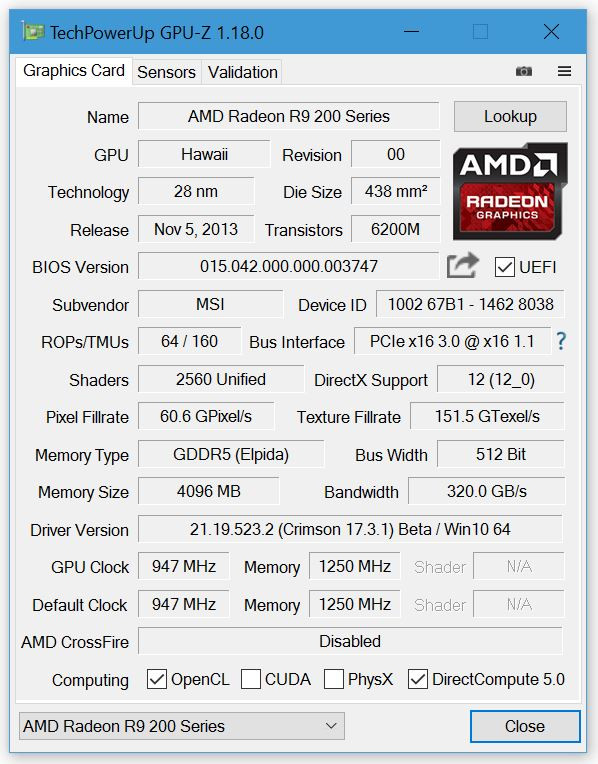Gpu Z Serial Number
Related Articles
- 1 Find Drivers for a Graphics Card
- 2 Check an iPhone Serial Number
- 3 Verify IMEI and ICCID on an iPhone
- 4 Identify an ASUS Motherboard
There is no way to see the serial number of the card without actually. Card you can use GPU-Z and/or GPU-Shark and/or EVEREST Ultimate. Edit: you might be able to get what you want through WMI. If you're looking for a serial number and/or asset tag for the hardware, you might be lucky with this. For the baseboard you might be able to use Win32_Baseboard. And for the CPU processor id, you might get what you need with Win32_Processor.
Whether you're setting up new computers for your office or creating an inventory of the hardware you already have, you may need to locate the serial number for a video card in order to add that info to your system data. If you purchase an Apple Macintosh computer, you only need one serial number to refer to the entire system, including its graphics adapter. Under Microsoft Windows, you may need to look in several places to find your video card's information.
1.
Power down your Windows PC and open the computer case to check its graphics adapter closely. Look for a sticker that contains the serial number. If you're not sure which card you're looking for, check for the port which your monitor cable plugs into, and examine the card that uses that port.
2.
Uncable and loosen the video card in the case so you can unplug it from the motherboard and remove it for closer inspection. If you don't find a serial-number sticker, look for a combination of numbers etched into and written on the card.
3.
Check the packaging in which you purchased the card, if you bought it separately from the computer. Look for a sticker on the warranty card or the flaps of the box. If you sent in the warranty card, check your files for a photocopy of it.
Serial Number Lookup
4.
Locate the invoice for your video-card purchase. Some technology vendors list the serial numbers of the items you purchase on the paperwork that documents what you bought.
Tips
- Use a GPU test utility (see Resources) to find out more information about your graphics card's hardware and performance capabilities.
- If you purchased the video card as part of a PC system, contact the company that manufactured your computer and provide information about your purchase, including other serial or invoice numbers, to obtain further details about your graphics adapter.
- Checking video card information through a Properties dialog box in Windows or other system-based means of displaying the card's name may provide inaccurate or incomplete information because it draws the details it reports from the driver software that powers the adapter, not from the card itself.
Warning
- If you remove your video card to look for a serial number, verify that you've reinstalled it correctly before you start your system backup.
References (2)
About the Author
Elizabeth Mott has been a writer since 1983. Mott has extensive experience writing advertising copy for everything from kitchen appliances and financial services to education and tourism. She holds a Bachelor of Arts and Master of Arts in English from Indiana State University.
Photo Credits
- Jupiterimages/Photos.com/Getty Images
Choose Citation Style
Graphics Processor
- GPU Name
- Polaris 20
- GPU Variant
- Polaris 20 XL
(215-0910052)
- Architecture
- GCN 4.0
- Foundry
- GlobalFoundries
- Process Size
- 14 nm
- Transistors
- 5,700 million
- Die Size
- 232 mm²
Graphics Card
- Release Date
- Oct 15th, 2018
- Generation
- Polaris
(RX 500)
- Production
- Active
- Bus Interface
- PCIe 3.0 x16
Clock Speeds
- GPU Clock
- 1168 MHz
- Boost Clock
1284 MHz
1310 MHz (+2%)
- Memory Clock
- 1750 MHz
7000 MHz effective
Memory
- Memory Size
- 4 GB
- Memory Type
- GDDR5
- Memory Bus
- 256 bit
- Bandwidth
- 224.0 GB/s
Render Config
- Shading Units
- 2048
- TMUs
- 128
- ROPs
- 32
- Compute Units
- 32
- L1 Cache
- 16 KB (per CU)
- L2 Cache
- 2 MB
Theoretical Performance
- Pixel Rate
41.09 GPixel/s
41.92 GPixel/s
- Texture Rate
164.4 GTexel/s
167.7 GTexel/s
- FP16 (half) performance
5.259 TFLOPS
5.366 TFLOPS (1:1)
- FP32 (float) performance
5.259 TFLOPS
5.366 TFLOPS
- FP64 (double) performance
328.7 GFLOPS
335.4 GFLOPS (1:16)

Board Design
- Slot Width
- Dual-slot
- Length
9.5 inches
9.53 inches241 mm
242 mm
- TDP
- 150 W
- Outputs
- 1x DVI
1x HDMI
3x DisplayPort
- Power Connectors
- 1x 8-pin
- Board Number
- C940,
D000
Graphics Features
- DirectX
- 12.0 (12_0)
- OpenGL
- 4.6
- OpenCL
- 2.0
- Vulkan
- 1.1.101
- Shader Model
- 6.4
Card Notes
| China Only SKU |
Polaris 20 GPU Notes
| Architecture Codename: Arctic Islands Codename: Ellesmere CLRX Version: GCN 1.2 Graphics/Compute: GFX8 (gfx803) Display Core Engine: 11.2 Unified Video Decoder: 6.3 Video Compression Engine: 3.4 |
Other retail boards based on this design (10)

| Name | GPU Clock | Boost Clock | Memory Clock | Other Changes |
|---|---|---|---|---|
| AMD Radeon RX 580 2048SP 8 GB | 1168 MHz | 1284 MHz | 1750 MHz | 8 GB |
| Dataland RX 580 2048SP X-Serial | 1168 MHz | 1310 MHz | 1750 MHz | 9.53 inches/242 mm |
| Dataland RX 580 2048SP X-Serial 8 GB | 1168 MHz | 1310 MHz | 1750 MHz | 8 GB, 9.53 inches/242 mm |
| MAXSUN RX 580 2048SP Big Mac | 1168 MHz | 1284 MHz | 1750 MHz | |
| MSI RX 580 2048SP ARMOR | 1168 MHz | 1284 MHz | 1750 MHz | 10.59 inches/269 mm |
| MSI RX 580 2048SP ARMOR 8 GB | 1168 MHz | 1284 MHz | 1750 MHz | 8 GB, 10.59 inches/269 mm |
| Sapphire RX 580 2048SP OC | 1168 MHz | 1306 MHz | 1750 MHz | 6.69 inches/170 mm, 1x DVI 2x HDMI 2x DisplayPort |
| Sapphire RX 580 2048SP OC 8 GB | 1168 MHz | 1306 MHz | 1750 MHz | 8 GB, 6.69 inches/170 mm, 1x DVI 2x HDMI 2x DisplayPort |
| XFX RX 580 2048SP Black Wolf | 1168 MHz | 1286 MHz | 1750 MHz | 9.57 inches/243 mm |
| XFX RX 580 2048SP Black Wolf 8 GB | 1168 MHz | 1286 MHz | 1750 MHz | 8 GB, 9.57 inches/243 mm |
